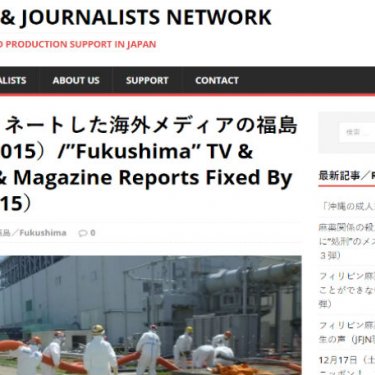Fixers and journalists network seen as guarantor of uncensored Fukushima coverage

On the occasion of the 6th anniversary of the Fukushima nuclear plant disaster, Reporters Without Borders (RSF) voices its support for Japan Fixers & Journalists Network (JFJN), who are available to help Japanese and foreign reporters cover the consequences of the disaster at time of continuing censorship and self-censorship of nuclear industry issues in Japan.
Freelance journalists Makiko Segawa and Takaho Murakami launched JFJN just over a year ago in response to two observations they made during the first few months after the March 2011 disaster.
Firstly, that no group of fixers, guides and interpreters existed in Japan although it had experienced the biggest environmental disaster in its history, one that made it very hard for the international media to cover the story. Secondly, that many Japanese media are reluctant to use the stories offered by freelancers and citizen journalists.
JFJN has a team of specialists in issues related to Fukushima and the surrounding northeastern region of Tohoku who are ready to work as fixers for foreign journalists planning to visit Fukushima, the nearby region or other parts of Japan to cover stories linked to the consequences of the disaster.
At the same time, JFJN works with a network of investigative journalists that cooperated with foreign reporters and academics from various countries including France, Switzerland and the United States for coverage of the 6th anniversary of the disaster.
Segawa and Murakami regard the 2019 Rugby World Cup and the 2020 Tokyo Olympics and Paralympics as an opportunity to reinforce their team of fixers and increase the foreign media’s awareness of nuclear industry issues and their consequences for the Tohoku region.
When interviewed by Tokyo-based journalist (read full article here) Lucy Birmingham last July, Murakami said: “We’re looking for candidates with foreign language ability, translation and interpreting skills, and ideally some journalism experience.”
“By uniting with the foreign media, the barriers of censorship can be broken,” Segawa told RSF. “We are enriching Japanese media coverage and we hope that, as we approach the Tokyo Olympic Games in 2020, we will be able to shed new light on the Tohoku region, which is nowadays forgotten by many media outlets.”
“We salute the commitment of Japanese journalists and citizen journalists who resist the censorship and self-censorship surrounding nuclear power issues in Japan,” said Benjamin Ismaïl, the head of RSF’s Asia-Pacific desk.
“Their work not only helps freedom of the media and information in Japan but also helps foreign journalists to find alternative sources of information on the subject. JFJN thereby contributes to diversity of news and information in many other countries.”
Respect for media freedom in Japan, which is ranked 72nd out of 180 countries in RSF’s 2016 World Press Freedom Index, has declined significantly since Shinzo Abe became prime minister again in December 2012.
On the eve of a visit to Japan in April 2016 by David Kaye, the UN special rapporteur on freedom of expression, RSF drew his attention to the disturbing decline in media freedom since 2012.



